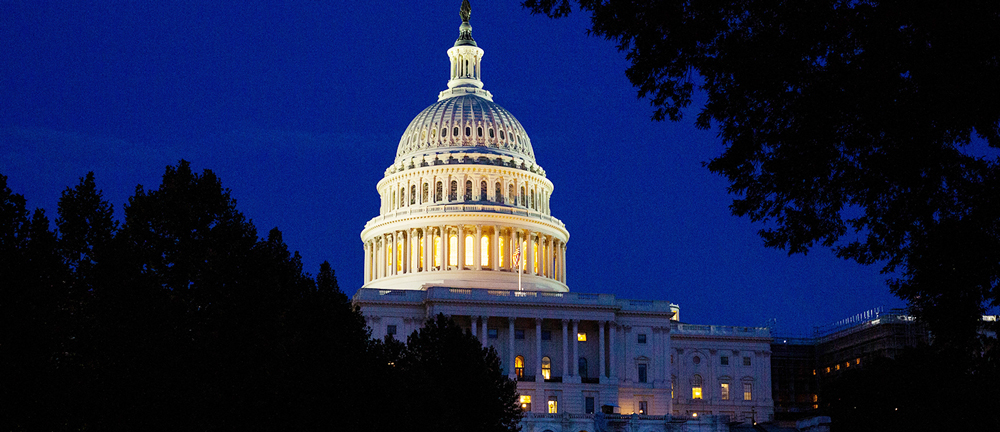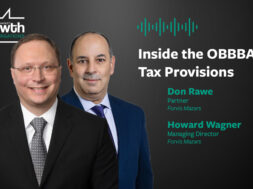Middle-Market Public Policy Roundup
The Senate passed a $2 trillion stimulus package, the House proposed a law to oversee that federal relief, and an HFSC member tests positive for COVID-19.

In this week’s roundup, we look at the Senate’s $2 trillion stimulus package to blunt the force of the economic fallout of the coronavirus for U.S. families and businesses. We also provide a summary of the House’s proposal to oversee that federal relief, along with news that a member of the House Financial Services Committee has tested positive for COVID-19.
Senate Passes $2 Trillion Stimulus Package
Less than a week after President Donald Trump proposed an economic stimulus plan to blunt the force of the economic fallout from the coronavirus outbreak, senators unanimously agreed on Wednesday to approve an aid package that would deploy more than $2 trillion to U.S. families and businesses—the largest stimulus package in U.S. history.
The Trump administration has been in negotiations with senators since Monday, when lawmakers rejected an earlier draft of the aid package. Four senators were absent for Wednesday’s vote, three of whom have self-quarantined after exposure to the virus. Despite absences, senators approved the aid package 96-0.
The stimulus bill now moves to the House, where lawmakers have pledged to approve it on Friday. Trump said he would sign the bill immediately.
If passed, the law would provide loans and other relief to U.S. businesses and direct payments to Americans who have lost income in an effort to jumpstart an economy ravaged by the pandemic.
Under the plan, single Americans would receive $1,200, married couples would get $2,400 and parents would collect $500 for each child under 17 years of age. Aid distribution would be limited based on income, with those making more than $99,000 per year not eligible to receive federal relief.
More than 3 million Americans applied for unemployment claims last week, according to Labor Department figures released Thursday, breaking all previous unemployment records in a single week and bringing an end to a more than a decade-long job growth.
The package includes $350 billion in small business loans for companies with fewer than 500 employees, yet many private equity-backed businesses will not be able to access those loans, according to reporting from Axios. The package preserves a Small Business Administration rule that considers private equity-owned companies to be “affiliated”—that is, a company’s employee count includes not only its own staff, but also those employed across the rest of the portfolio. By that accounting, thousands of private equity-owned companies will be considered too large to qualify for the stimulus package’s small business loans, according to Axios.
Word of Senators settling on a plan for the aid package provided a lift for public stock indexes. As of 12:30 p.m. Thursday, the Dow Jones has risen more than 1,100 points.
House Financial Services Committee Proposes Panel to Oversee Federal Aid Disbursement
The House Committee on Financial Services has released a plan to oversee the disbursement of federal funds from the stimulus packages to help combat the impact of the COVID-19 pandemic.
The Financial Protections and Assistance for America’s Consumers, States, Businesses, and Vulnerable Populations Act includes provisions to promote financial stability and transparent markets, including a bill from Rep. Dean Phillips, D-Minn., to establish a COVID-19 Aid Congressional Oversight Panel and authorize a special Inspector General to coordinate audits and investigations in connection with COVID-19 federal aid provided to corporations.
“We are about to inject a massive and unprecedented amount of taxpayers’ money into our economy to protect jobs and keep businesses afloat,” Phillips said in a statement. “This requires proper oversight to prevent corruption and ensure the money is being used efficiently and effectively.
The congressional panel and the increased powers for the inspector general will amplify and strengthen the government’s financial stewardship of this recovery and provide the transparency necessary to inspire Americans’ faith in the government, Phillips added.
The COVID-19 Aid Congressional Oversight Panel, in conjunction with the special Inspector General, would also be required to collect and report on diversity data from corporate recipients of federal aid related to COVID-19.
This legislation executes the plan released by Financial Services Chairwoman Rep. Maxine Waters, D-Calif., last week.
Financial Services Committee Member Diagnosed with COVID-19
A member of the House Committee on Financial Services has tested positive for COVID-19.
Rep. Ben McAdams, D-Utah, was among the first members of Congress to test positive for the disease after he developed mild cold-like symptoms after returning to Utah from Washington, D.C., on March 14, according to a statement. He has been in self-quarantine since the diagnosis.
“I’m doing my part as all Americans are doing to contain the spread of the virus and mitigate the coronavirus outbreak,” said McAdams, who joined the committee after being elected to Congress in 2018.
Rep. Maxine Waters issued a statement following Representative McAdams’ announcement. “I and my colleagues are all wishing Representative McAdams a speedy recovery and good health,” she said. “As a new Member of the Financial Services Committee this Congress, Representative McAdams is a tireless, hardworking advocate for Utahans, and it is no surprise that even now he is working from home to help his constituents.”
In addition to McAdams, one other representative and two senators have tested positive for coronavirus.
Are you an ACG member who enjoys reading the public policy roundup? Join our Public Policy Interest Group to receive even more in-depth coverage of federal policy activity impacting the middle market, as well as opportunities to help shape ACG’s advocacy efforts.

Benjamin Glick is ACG Global’s marketing and communications associate.


